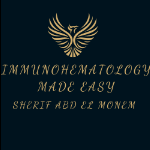Malcolm Needs's Achievements
Single Status Update
See all updates by Malcolm Needs
-
Good Morning Malcolm,
My boss asked me an interesting question yesterday and I wanted to pick your brain about it. The question was, once an anti-M is determined to be clinically insignificant, is there a need to prove that again in future samples?
I told her that I believe it was. In my experience, I've learned that what may apply to one patient does not mean that another patient would not react differently. So... just because an anti-M is determined to be insignificant at a certain point in time, does not mean it there isn't a possibility of it converting in the future to a significant antibody and this could vary from patient to patient. Basically, I'm on the side of not making an assumption.
This resulted in my pondering what other labs are doing and it is difficult to find specific info regarding this scenario. There is plenty of articles on determining the clinical significance of anti-M, but not on the frequency of doing so for previously identified insignificant anti-M.
Anyway, I thought it would be interesting to see how this was treated under your guidance.
Steve
- Show previous comments 2 more
-

No problem Steve.
The policy was changed because so many of our hospitals were using gCAT that, as you say, it was causing cross-matching issues at the hospitals. According to the BCSH Guidelines, if there are no clinically significant antibodies present, they could cross-match by "immediate spin" technique or by electronic issue. However, so many hospital Chief Biomedical Scientists were too scared to do this, or let their staff do it, that we found we were having to cross-match loads of units for them (for which we did not have sufficient staff), and so our Testing Department started to M type more units (but, as explained above, not enough)!
-

Malcolm, do you have references close at hand for anti-M in pregnancy? We have an OB patient with an anti-M that reacts in gel but not a pre-warmed saline tube technique that we use to determine significance. The OB/GYN is anxious and wants to order titers even though we recommend against it. Also, I'd love a reference on the Japanese issue with anti-M HDFN if you have the time.
-

Sorry to take a bit of time answering Mabel. We are having our place decorated, and are also having it valued by three different estate agents and, to cap it all, I am having my car repaired! Never a dull moment!
As far as papers about anti-M in pregnancy are concerned, there are not many because, as Geoff Daniels writes, HDFN caused by anti-M is rare (and few people publish when an antibody is found not to be clinically significant, unless the antibody itself is rare, and not much is known about it), but Geoff does caution that HDFN, when caused by anti-M, can be quite severe., the papers he quotes are as follows:
Stone B, Marsh WL. Haemolytic disease of the newborn caused by anti-M. Brit J Haematol 1959; 5: 344-347.
Macpherson CR, Zartman ER. Anti-M antibody as a cause of intrauterine death. A follow-up. Am J CLin Path 1965; 43: 544-547.
Yoshida Y, Yoshida H, Tatsumi K, Asoh T, Hoshino T, Matsumoto H. Successful antibody elimination in severe M-incompatible pregnancy. New Eng J Med 1981; 305: 460-461.
Duguid JKM, Bromilow IM, Entwistle GD, Wilkinson R. Haemolytic disease of the newborn due to anti-M. Vox Sang 1995; 68: 195-196.
Furukawa K, Nakajima T, Kogure T, Yazaki K, Yoshida M, Fukaishi T, Ibuki Y, Igarashi M. Example of a woman with multiple intrauterine deaths due to anti-M who delivered a live child after plasmapheresis. Exp Clin Immunogenet 1993; 10: 161-167.
Kanra T, Yuce K, Ozcebe OI. Hydrops fetalis and intrauterine deaths due to anti-M. Acta Obstet Gynecol Scand 1996; 75: 415-417.
Hinchliffe RF, Nolan B, Vora AJ, Stamps R. Neonatal pure red cell aplasia due to anti-M. Arch Dis Child Fetal Neonatal Ed 2006; 91: F467-F468.
Wikman A, Edner A, Gryfelt G, Jonsson B, Henter J-I. Fatal hemolytic anemia and intruterine death caused by anti-M immunization. Transfusion 2007; 47: 911-917.
There are two papers concerning anti-M in the Japanese population are as follows (the first quoted by Geoff in his book; the second by a group of us in a BSH Guideline).
Yasuda H, Nollet K, Ohto H. A review of hemolytic disease of the fetus and newborn due to MN incompatibility in Japan. Vox Sang 2009; 97 (Suppl.1): 125 (Abstract).
Yasuda H, Ohto H, Nollet KE, Kawabata K, Saito S, Yagi Y, Neggishi Y, Ishida A. Hemolytic disease of the fetus and newborn with late-onset anemia due to anti-M: a case report and review of the Japanese literature. Transfusion Medicine Reviews 2014; 28: 1-6.
Klein and Anstee in Mollison's Blood Transfusion in Clinical Medicine 12th edition, do not see anti-M causing HDFN as common enough even to mention it!
This was a bit of a "rush job" in the end, so I hope it is of some use, but, if not, please get back to me.





(1).thumb.jpg.cda8f7dd264bee107c3edfc6c4168401.jpg)


